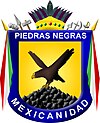Ciudad Porfirio Diaz
| Piedras Negras | ||
|---|---|---|
|
||
| Nickname(s): The Safe Border! | ||
| Coordinates: 28°42′00″N 100°31′23″W / 28.70000°N 100.52306°WCoordinates: 28°42′00″N 100°31′23″W / 28.70000°N 100.52306°W | ||
| Country | Mexico | |
| State | Coahuila | |
| Municipality | Piedras Negras | |
| Established | June 15, 1850 | |
| Government | ||
| • Mayor |
Jose Manuel Maldonado (PRI) 2010 Oscar López Elizondo(PRI) 2010–2013 |
|
| Area | ||
| • City | 914.2 km2 (353.0 sq mi) | |
| Elevation | 223 m (732 ft) | |
| Population (2015) | ||
| • City | 163,595 | |
| • Density | 180/km2 (460/sq mi) | |
| • Urban | 163,595 | |
| • Metro | 194,293 | |
| Demonym(s) | Nigropetense | |
| Time zone | CST (UTC-6) | |
| Postal code | 26000 | |
| Area code(s) | 878 | |
| Airport | Piedras Negras Int. Airport | |
| Website | piedrasnegras.gob.mx | |
Jose Manuel Maldonado (PRI) 2010
Piedras Negras (Spanish pronunciation: [ˈpjeðɾas neɣɾas]) (Black stones) is a city and seat of the surrounding municipality of the same name in the Mexican state of Coahuila. It stands at the northeastern edge of Coahuila on the U.S.-Mexico border, across the Río Bravo (Rio Grande) from Eagle Pass in the U.S. state of Texas. In the 2012 census the city had a population of 163,595 people, which accounted for 91 percent of its municipality's total population of 163,595. The municipality's relatively small area includes some minor localities outside the city limits. The Eagle Pass and Piedras Negras area is connected by the Eagle Pass-Piedras Negras International Bridge, Camino Real International Bridge, and the Eagle Pass Union Pacific International Railroad Bridge.
Founded in 1849, the city was renamed Ciudad Porfirio Díaz in 1888, in homage to President Porfirio Díaz. It reverted to its original name following the Mexican Revolution.
In Spanish Piedras Negras translates to "black stones" – a reference to coal deposits in the area. Across the river, coal was formerly mined on the US side at Dolchburg, near Eagle Pass. This mine closed around 1905, after a fire. Mexico currently operates two large coal-fired power plants named "José López Portillo" and "Carbón 2" located 30 miles (48 km) south of Piedras Negras.
...
Wikipedia


